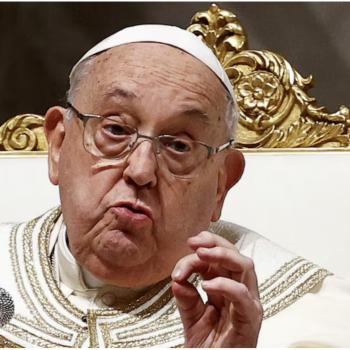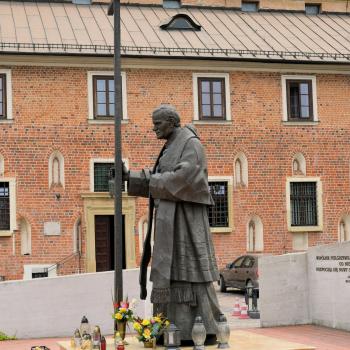Nevertheless, sixteen years ago I was not an enthusiastic officiant at a Prayer Book Celebration of the Marriage of two women whom I had come to know and love as members of my congregation. Subsequently, they were legally married in California before the passage of Proposition 8. I would have been happier with "blessing" their relationship. But they insisted, and I'm glad they did. Now, one a corporate lawyer and the other an elementary school principal with a wonderful adopted daughter, they are a stellar example of why legal marriage of same-sex partners is a compelling interest for civil society.
The church has always served the important role in society of validating and signaling the social acceptance of marginal or alternative groups by means of liturgical and ceremonial inclusion in the life of the worshiping community. If openly LGBT people are eligible for baptism, then on what grounds can they be denied Holy Wedlock or Ordination? And especially in states where marriage rights have been extended to same-sex partners, pressure mounts on the Episcopal Church to extend its official pastoral ministry, the blessing of the Church, to all.
The situation the American Church finds itself in could not be more delicate. At the last General Convention a belated resolution was passed at the behest of the retiring Presiding Bishop supposedly on behalf of the Archbishop of Canterbury for the sake of unity of the Anglican Communion. Resolution B033 (which calls on the Episcopal Church to exercise "restraint" by not consecrating bishops "whose manner of life presents a challenge to the wider church") may very well be rescinded in the physical presence of that same Archbishop of Canterbury who is attending his first American convention as honored guest.
Should that happen, more consecrations of partnered gay and lesbian bishops would surely follow, as would trial-use of official same-sex marriage rites. The result would further alienate the Episcopal Church from the Anglican Communion, possibly leading to formal sanction, even "excommunication." At the same time there is a sense in which to continue to "exercise restraint" would betray a large and committed group of members for too long marginalized and regarded as expendable. Such a sacrifice for the sake of a unity that is hardly real even with the "restraint" of B033 seems inconceivable, especially to delegates formed by the logic of Dr. Martin Luther King, Jr.'s, letter from the Birmingham Jail, "Why We Can't Wait."
In my own congregation there are a variety of views that fall into four categories. In the more traditionalist, older generation that sees change as inevitable but a little disconcerting, there are those who reject homosexuality from a certain kind of ignorance. They simply haven't known any, hard as that may seem in the Bay Area. Then there are those whose faith is informed by their early catechetical training, often from the Roman Catholic Church. For them, the ordination of women made anything possible. They seem simply to operate practically, as in their integrated work world, and look for integrity not for an inherent moral conformity.
Among the younger folk, many of whom grew up under the Reagan ideological idealism, without the tempering of the Vietnam disillusionment, there also appear to be basically two groups -- those, however conservative they may be, whose sense of comfort with difference in their world and whose moral compass that focuses on God as the defender of the outcast enable them to embrace same-sex expressions; and those who, out of an apparent need for moral order or perhaps from unhappy experiences in youth, are very clear that homosexual ordination and marriage, or at least ministry of gay clergy among straight families, is simply not right.
The problem, as I see it, is one that has prevailed for many years. Very few people are willing to report their true feelings, even to me -- or perhaps especially to me -- out of fear that they themselves will be shunned or labeled as "homophobic." Some will simply go away, refusing to be engaged in conversation, rather than make a public scene.
So, my fear remains that the extent of those who will offer "public narratives," what in another context and community might comfortably be called "witness or testimony," will be confined to voices that agree with the prevailing evangelism of inclusivity. At its best, the General Convention is a Great Revival Meeting of liberal, well-educated, political activists.
The experience of mutuality, openness, and communion described theologically by the Ubuntu theme, while genuinely renewing the participants in their conversations and vocation, will become a cause of yet further global alienation by those already suspicious and vigilant, while remaining a thunder in the distance to those whose connection is with the comfortable worship of the local parish.
 Jim is in his fifteenth year as Rector of St. Stephen's Episcopal Church, Belvedere-Tiburon in Marin County, CA. A native San Franciscan, Jim graduated from Yale College and the Berkley Divinity School at Yale where he was a Trustee and now serves on the National Advisory Council. He has served churches in Silicone Valley and the East Bay and was rector of St. Cuthbert's, Oakland. He has also served as Director of Field Education at the Church Divinity School of the Pacific in Berkeley, CA. Jim is active in Cursillo and in Kairos Prison ministry at San Quentin, tutors with Bridge the Gap Tutoring in Marin City, and enjoys square dancing with his wife. Jim and Janet have three children. He is also the father of two grown daughters and has four grandchildren.
Jim is in his fifteenth year as Rector of St. Stephen's Episcopal Church, Belvedere-Tiburon in Marin County, CA. A native San Franciscan, Jim graduated from Yale College and the Berkley Divinity School at Yale where he was a Trustee and now serves on the National Advisory Council. He has served churches in Silicone Valley and the East Bay and was rector of St. Cuthbert's, Oakland. He has also served as Director of Field Education at the Church Divinity School of the Pacific in Berkeley, CA. Jim is active in Cursillo and in Kairos Prison ministry at San Quentin, tutors with Bridge the Gap Tutoring in Marin City, and enjoys square dancing with his wife. Jim and Janet have three children. He is also the father of two grown daughters and has four grandchildren.




